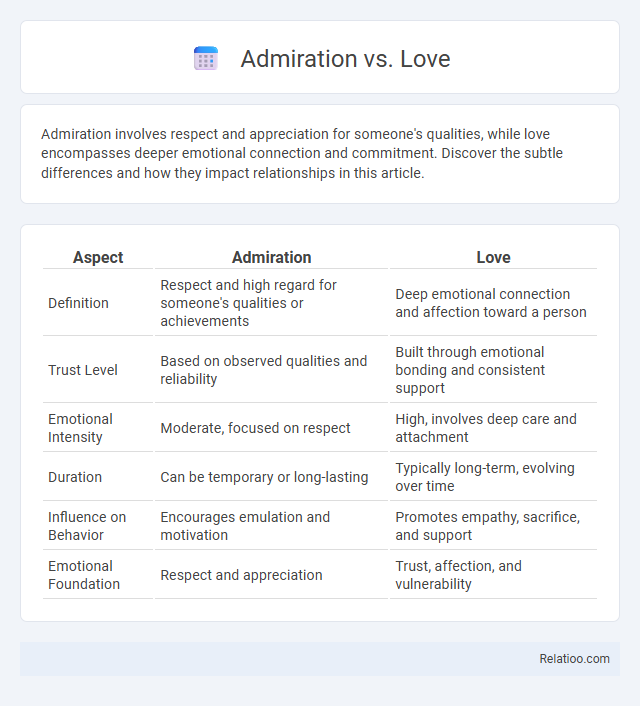Admiration involves respect and appreciation for someone's qualities, while love encompasses deeper emotional connection and commitment. Discover the subtle differences and how they impact relationships in this article.
Table of Comparison
| Aspect | Admiration | Love |
|---|---|---|
| Definition | Respect and high regard for someone's qualities or achievements | Deep emotional connection and affection toward a person |
| Trust Level | Based on observed qualities and reliability | Built through emotional bonding and consistent support |
| Emotional Intensity | Moderate, focused on respect | High, involves deep care and attachment |
| Duration | Can be temporary or long-lasting | Typically long-term, evolving over time |
| Influence on Behavior | Encourages emulation and motivation | Promotes empathy, sacrifice, and support |
| Emotional Foundation | Respect and appreciation | Trust, affection, and vulnerability |
Understanding Admiration and Love
Admiration involves recognizing and valuing someone's qualities or achievements, often with a sense of respect or awe, while love encompasses deeper emotional attachment, care, and commitment. Understanding admiration requires identifying the specific traits that inspire respect without necessarily involving emotional intimacy, whereas love integrates admiration but is characterized by a strong emotional bond and desire for closeness. Distinguishing between admiration and love helps clarify personal feelings and guides relationship dynamics effectively.
Key Differences Between Admiration and Love
Admiration involves recognizing someone's qualities or achievements, often from a distance, without deep emotional involvement, whereas love encompasses a profound emotional bond, commitment, and intimacy. Admiration can exist without personal attachment, while love requires emotional interdependence and vulnerability. Understanding these distinctions is crucial for navigating personal relationships and emotional connections effectively.
Psychological Foundations of Admiration
Admiration is rooted in recognizing and valuing exceptional qualities or achievements in others, often triggering motivation and positive social emotions. Psychological foundations of admiration involve cognitive appraisal processes that highlight perceived excellence, fostering inspiration and an approach-oriented attitude toward the admired person or attribute. Unlike love, which encompasses deep emotional attachment and interpersonal bonding, admiration is more cognitive and evaluative, linked closely to respect and aspirational behavior.
Emotional Depth: Comparing Love and Admiration
Love encompasses profound emotional depth characterized by intimacy, vulnerability, and a complex interplay of affection and attachment, whereas admiration primarily involves respect and appreciation for someone's qualities or achievements without intense emotional involvement. Emotional depth in love often includes empathy, passion, and a desire for closeness, while admiration remains more cognitive and less tied to personal feelings. Understanding these differences highlights how love integrates emotional richness that goes beyond the surface appreciation found in admiration.
Signs of Pure Admiration in Relationships
Signs of pure admiration in relationships include consistent respect for a partner's values, achievements, and character without expecting reciprocation or emotional attachment. This form of admiration manifests through genuine compliments, active listening, and unwavering support for personal growth. Unlike love or infatuation, admiration remains steady, focused on valuing the other person's true self rather than idealized emotions.
How Love Manifests Beyond Admiration
Love manifests beyond admiration through a deep emotional connection that transcends surface-level appreciation, fostering intimacy, trust, and commitment. While admiration highlights qualities or achievements, love engages vulnerability and unconditional support, creating a lasting bond. This profound attachment motivates sacrifice and acceptance, distinguishing love from mere admiration or respect.
Can Admiration Evolve into Love?
Admiration is often the foundation of strong emotional connections, characterized by respect and appreciation for someone's qualities, while love encompasses deeper affection, attachment, and commitment. You can experience admiration for someone's talents or character, which may gradually evolve into love as emotional intimacy and shared experiences grow. This transformation occurs when admiration moves beyond surface-level appreciation to include empathy, vulnerability, and mutual support.
Potential Pitfalls of Confusing Admiration with Love
Confusing admiration with love can lead to unrealistic expectations and emotional disappointment, as admiration is often based on qualities or achievements rather than deep emotional connection. Admiration typically focuses on admiring someone's talents or status, while love encompasses intimacy, commitment, and mutual vulnerability. Misinterpreting admiration for love may prevent individuals from forming authentic, balanced relationships that require deeper understanding and emotional investment.
Building Healthy Relationships: Balancing Admiration and Love
Balancing admiration and love in your relationships fosters mutual respect and deeper emotional connection, as admiration reinforces positive qualities while love nurtures trust and vulnerability. Recognizing the difference allows you to appreciate your partner's strengths without idealizing them, creating a healthier, more realistic bond. Prioritizing open communication and empathy helps maintain equilibrium between admiration and love, essential for long-term relationship satisfaction.
Deciding What You Feel: Love, Admiration, or Both?
Deciding what you feel--love, admiration, or both--requires understanding the emotional depth and connection in your relationship. Love often involves a profound emotional bond and commitment, while admiration centers on respect and appreciation for someone's qualities or achievements. Your feelings may blend both, reflecting both a heartfelt attachment and genuine respect for the person.

Infographic: Admiration vs Love
 relatioo.com
relatioo.com